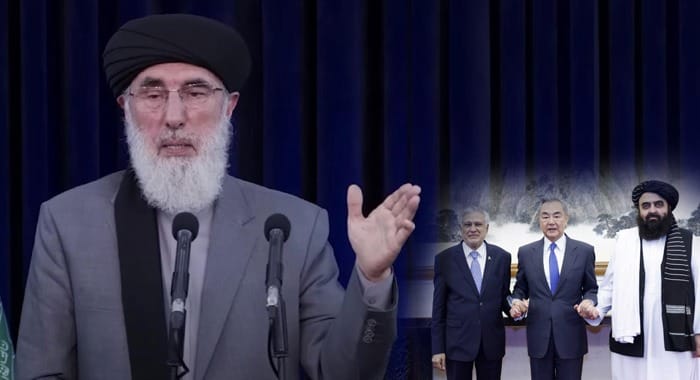Gulbuddin Hekmatyar, leader of the Hezb-e-Islami political party, has voiced deep concern over recent international statements and developments regarding Afghanistan, warning of increasing foreign interference in the country’s future.
In a written statement, Hekmatyar criticised the outcomes of a recent trilateral meeting in Beijing between the foreign ministers of China, Pakistan, and the Taliban, where Afghanistan’s potential inclusion in China’s Belt and Road Initiative (BRI) was discussed. Simultaneously, the U.S. State Department revealed it is still considering whether to designate the Taliban as a terrorist organisation.
Highlighting a series of related diplomatic remarks, Hekmatyar noted that Russian Foreign Minister Sergey Lavrov expressed Moscow’s willingness to engage with the U.S. over Afghanistan. Russia’s special envoy for Afghanistan, Zamir Kabulov, downplayed the strategic significance of the Bagram airbase, while President Vladimir Putin previously warned that leftover U.S. weaponry in Afghanistan could destabilise the region, a concern echoed by Pakistan’s defence minister and Indian officials, who alleged U.S. weapons were used in recent attacks on tourists.
Hekmatyar accused Russia and the United States of potentially using Afghanistan as a bargaining chip in broader geopolitical negotiations, particularly concerning the war in Ukraine. He argued that Moscow may be open to a deal that trades U.S. concessions in Ukraine for influence over Afghanistan.
The veteran Afghan leader also warned of a unified backlash from the U.S., India, and Iran in response to China’s deepening involvement with the Taliban. He suggested that the BRI expansion into Afghanistan could undermine the Iran-India Chabahar port project, prompting strong reactions, especially from Washington, which had expected the Taliban to steer clear of such strategic agreements.
According to Hekmatyar, U.S. President Donald Trump has persistently demanded the return of leftover U.S. military equipment from Afghanistan, using it as a recurring theme in his political messaging. He predicts that key regional players, including Moscow, Islamabad, New Delhi, and even Tehran, may support U.S. efforts to reclaim its military assets, just as they once aligned during the NATO-led intervention in Afghanistan.





